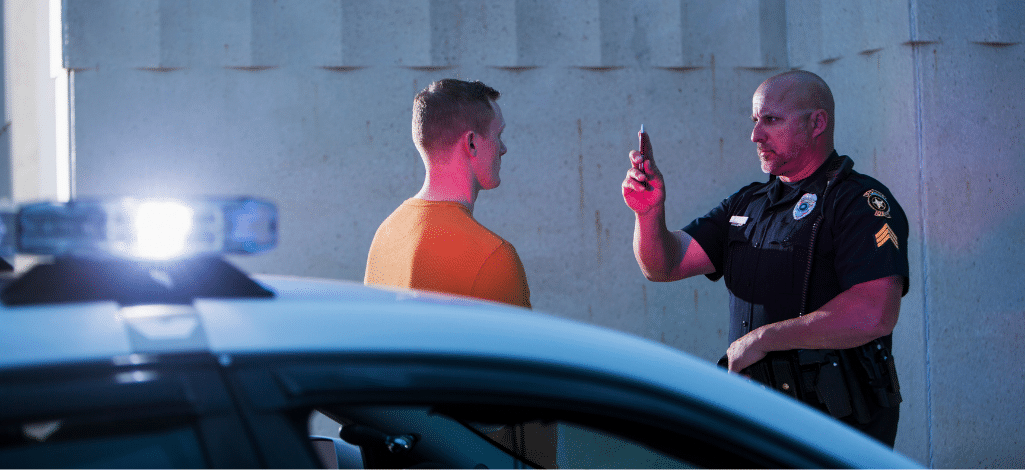Background
This case takes place in a small town on Lake Huron. In March 2016, Ontario police spotted the accused, Mr. McColman, driving an ATV out of a convenience store parking lot onto a highway. They decided to follow. Officers caught up about a minute later after the accused pulled into the private driveway of his parents’ home. The officers observed signs of obvious impairment – Mr.McColman could not stand up straight and smelled strongly of alcohol, telling officers he may have had 10 beers that evening.
The officers arrested him for impaired driving and brought him to the police station where he did two breathalyzer tests. He was charged with impaired driving and operating a motor vehicle with a blood alcohol concentration above the legal limit.
At trial, the officers argued they were exercising their authority to conduct random sobriety checks under section 48(1) of the Ontario Highway Traffic Act (the “HTA”) which provides that a police officer “may require the driver of a motor vehicle to stop for the purpose of determining whether or not there is evidence to justify making a demand under section 320.27 or 320.28 of the Criminal Code.” Section 216(1) of the HTA broadly empowers recognizable police officers to conduct vehicle stops after signaling a request to the driver. These two sections together empower readily identifiable police officers to make traffic stops to investigate impaired driving.
Mr. McColman argued that the random sobriety stop was illegal under section 48(1) because it was conducted on private property and constituted an arbitrary detention contrary to section 9 of the Charter. Notably, an officer testified that they did not see any signs of impairment before stopping Mr. McColman (and did not have reasonable and probable grounds absent the stop).
The trial judge found him guilty. On appeal at the Ontario Superior Court, the appeal judge found that neither section 48(1) nor 216(1) of the HTA permitted officers to conduct sobriety or highway safety stops on private property, excluding the evidence obtained and entering an acquittal.
The Crown appealed the acquittal, arguing that police were authorized to effect random sobriety stops on private property if they form the lawful intention to stop a driver on the highway. A majority for the Court of Appeal, in upholding the acquittal, found that the stop was unlawful, and that the plain language of s.48(1) did not authorize sobriety stops off the highway.
The Supreme Court’s Decision
The Supreme Court did not grant leave on the issue of whether the police had common law authority to conduct the stop. The main issue was whether section 48(1) of the HTA permitted police to conduct random sobriety stops on private property. The key question was whether Mr. McColman was a “driver” at the time of the sobriety stop. The Supreme Court ruled that to be a “driver” within section 48(1) of the HTA, Mr.McColman needed to be both in care and control of a motor vehicle and be driving on the highway.
The Crown argued that this interpretation would create a sanctuary problem, where future impaired drivers would pull onto private property whenever they spot a police cruiser. The Supreme Court opined that this problem is “overstated”, commenting that reasonable and probable grounds still empower officers to stop drivers for sobriety tests, and, absent a constitutional challenge, s.48(1) did not intend to empower Ontario officers to conduct random sobriety stops on private property.
The Supreme Court considered several appellate decisions. In R. v. Lux, 2012 SKCA 129, police officers observed a motor vehicle driving in a private parking area and conducted a random sobriety stop while still within the private parking area. The Saskatchewan Court of Appeal found that section 209.1 of The Traffic Safety Act, S.S. 2004, c. T-18.1, which specifically empowers officers to conduct a “field sobriety test” after stopping a person operating a motor vehicle, did not authorize random sobriety stops on private property because the TSA’s definition of “highway” excluded private properties.
Two years later, in R. v. Anderson, 2014 SKCA 32, a factually similar case, the Saskatchewan Court of Appeal held that an officer who had formed his intention on a highway to randomly stop the vehicle could lawfully complete the stop on private property, to provide “sufficient flexibility in carrying out his duties”. The entry onto private property, to complete the check stop, was reasonably necessary.
Ultimately, the Supreme Court allowed the appeal but restored the conviction, favouring inclusion of the evidence obtained by the stop in an 8:0 decision. Justice Brown was on a leave of absence and did not participate in the final disposition of this judgment.
In BC
Similar situations have been considered in BC. Section 73(1) of the Motor Vehicle Act, RSBC 1996 c. 318 (the “MVA”) broadly empowers readily identifiable peace officers in BC to request a traffic stop. In R v. Williams, 2001 BCPC 149, Judge Doherty found an unlawful detention in circumstances where an officer followed a suspected impaired driver onto the front steps of his dwelling and made a breathalyzer demand after noting signs of intoxication. Judge Doherty ruled that the stop constituted an unlawful detention, noting the officer did not have reasonable and probable grounds to stop the vehicle.
In R v. Haloran, 2007 BCSC 1425, a patrol officer in Campbell River received information via a police dispatcher that there was a possible impaired driver leaving a gas station. The officer was given a description of the vehicle and license plate number, which he used to obtain the driver’s address. He caught up with the driver around his residence and engaged emergency lights. The driver did not stop and proceeded to pull into his driveway after being followed for approximately 300 – 500 meters. The trial judge relied on R v. Williams, following Judge Doherty’s analysis. An acquittal was entered as none of the usual reasons that would permit an officer to go onto private property existed on the facts, such as hot pursuit or exigent circumstances.
On appeal, the BC Supreme Court considered whether there was a valid distinction between an investigation leading to a detention on a driveway outside of a private dwelling house and an investigation that leads to a detention involving the dwelling house itself. The Court ruled that what happens on the driveway of a property is not subject to the same insulation against police investigations as the dwelling itself, because of the implied invitation to enter upon a driveway which is exposed to both public view and ready communication. It was indisputable that the officer was looking for the vehicle to stop it, in order to investigate the report of impairment. He did not require any more information to stop the vehicle or check the sobriety of the driver.
Justice Cullen ultimately concluded that R v. Williams was wrongly decided, finding that the officer “had a legitimate basis for entering on the driveway – to check on the possible impairment of a driver because of the report from a third party, and, perhaps, because of the driver’s failure to respond to the police signal to stop.” A new trial was ordered. Similar facts have not been reported by BC Courts since Haloran.
Conclusion
Having provincially regulated highway safety standards interact with the Criminal Code in empowering police officers to make traffic stops to check for sobriety means that the specific powers of officers across provinces will have subtle differences depending on what each legislature has drafted.
In Ontario, the police power to make a traffic stop for the purposes of a random sobriety test does not extend to private driveways. In BC, a legitimate investigative basis may be required following R v. Haloran. The scope of section 73(1) of the MVA for a random sobriety stop on private property has yet to be considered, but in light of the Supreme Court’s decision in McColman, a similar conclusion may be likely.
If your require additional information or further assistance, please contact David McKnight and Naomi Krueger.




